Zone Configuration Using Home Assistant
You will need to have HACS and Plotly installed to make it easier to visualize the zones. If you already have HACS then you can skip Step 1. Same for Step 2 if you have Plotly.
1. Install HACS
2. Install Plotly
3. Copy the code below and add thisa Home Assistant card to visualize your zones. You will need to change all of the sensor_apollo_mtr_1 entity IDs to match your MTR-1 device. This can be done quickly by using a code editor.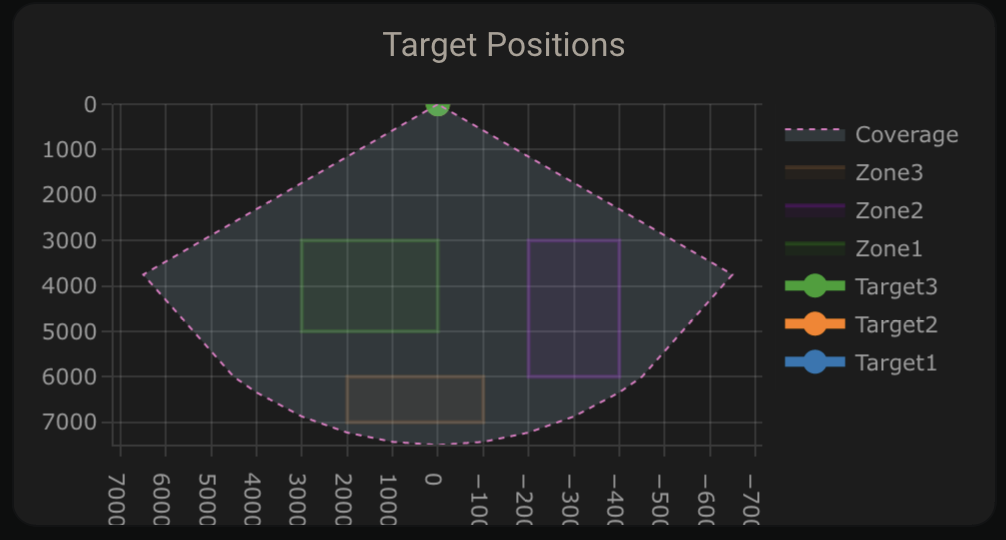
type: custom:plotly-graph
title: Target Positions
refresh_interval: 1
hours_to_show: current_day
layout:
height: 230
margin:
l: 50
r: 20
t: 20
b: 40
showlegend: true
xaxis:
dtick: 1000
gridcolor: RGBA(200,200,200,0.15)
zerolinecolor: RGBA(200,200,200,0.15)
type: number
fixedrange: true
range:
- 4000
- -4000
yaxis:
dtick: 1000
gridcolor: RGBA(200,200,200,0.15)
zerolinecolor: RGBA(200,200,200,0.15)
scaleanchor: x
scaleratio: 1
fixedrange: true
range:
- 7500
- 0
entities:
- entity: ''
name: Target1
marker:
size: 12
line:
shape: spline
width: 5
x:
- $ex hass.states["sensor.apollo_mtr_1_982da4_target_1_x"].state
'y':
- $ex hass.states["sensor.apollo_mtr_1_982da4_target_1_y"].state
- entity: ''
name: Target2
marker:
size: 12
line:
shape: spline
width: 5
x:
- $ex hass.states["sensor.apollo_mtr_1_982da4_target_2_x"].state
'y':
- $ex hass.states["sensor.apollo_mtr_1_982da4_target_2_y"].state
- entity: ''
name: Target3
marker:
size: 12
line:
shape: spline
width: 5
x:
- $ex hass.states["sensor.apollo_mtr_1_982da4_target_3_x"].state
'y':
- $ex hass.states["sensor.apollo_mtr_1_982da4_target_3_y"].state
- entity: ''
name: Zone1
mode: lines
fill: toself
fillcolor: RGBA(20,200,0,0.06)
line:
color: RGBA(20,200,0,0.2)
shape: line
width: 2
x:
- $ex hass.states["number.apollo_mtr_1_982da4_zone_1_x1"].state
- $ex hass.states["number.apollo_mtr_1_982da4_zone_1_x1"].state
- $ex hass.states["number.apollo_mtr_1_982da4_zone_1_x2"].state
- $ex hass.states["number.apollo_mtr_1_982da4_zone_1_x2"].state
- $ex hass.states["number.apollo_mtr_1_982da4_zone_1_x1"].state
'y':
- $ex hass.states["number.apollo_mtr_1_982da4_zone_1_y1"].state
- $ex hass.states["number.apollo_mtr_1_982da4_zone_1_y2"].state
- $ex hass.states["number.apollo_mtr_1_982da4_zone_1_y2"].state
- $ex hass.states["number.apollo_mtr_1_982da4_zone_1_y1"].state
- $ex hass.states["number.apollo_mtr_1_982da4_zone_1_y1"].state
- entity: ''
name: Zone2
mode: lines
fill: toself
fillcolor: RGBA(200,0,255,0.06)
line:
color: RGBA(200,0,255,0.2)
shape: line
width: 2
x:
- $ex hass.states["number.apollo_mtr_1_982da4_zone_2_x1"].state
- $ex hass.states["number.apollo_mtr_1_982da4_zone_2_x1"].state
- $ex hass.states["number.apollo_mtr_1_982da4_zone_2_x2"].state
- $ex hass.states["number.apollo_mtr_1_982da4_zone_2_x2"].state
- $ex hass.states["number.apollo_mtr_1_982da4_zone_2_x1"].state
'y':
- $ex hass.states["number.apollo_mtr_1_982da4_zone_2_y1"].state
- $ex hass.states["number.apollo_mtr_1_982da4_zone_2_y2"].state
- $ex hass.states["number.apollo_mtr_1_982da4_zone_2_y2"].state
- $ex hass.states["number.apollo_mtr_1_982da4_zone_2_y1"].state
- $ex hass.states["number.apollo_mtr_1_982da4_zone_2_y1"].state
- entity: ''
name: Zone3
mode: lines
fill: toself
fillcolor: RGBA(200,120,55,0.06)
line:
color: RGBA(200,120,55,0.2)
shape: line
width: 2
x:
- $ex hass.states["number.apollo_mtr_1_982da4_zone_3_x1"].state
- $ex hass.states["number.apollo_mtr_1_982da4_zone_3_x1"].state
- $ex hass.states["number.apollo_mtr_1_982da4_zone_3_x2"].state
- $ex hass.states["number.apollo_mtr_1_982da4_zone_3_x2"].state
- $ex hass.states["number.apollo_mtr_1_982da4_zone_3_x1"].state
'y':
- $ex hass.states["number.apollo_mtr_1_982da4_zone_3_y1"].state
- $ex hass.states["number.apollo_mtr_1_982da4_zone_3_y2"].state
- $ex hass.states["number.apollo_mtr_1_982da4_zone_3_y2"].state
- $ex hass.states["number.apollo_mtr_1_982da4_zone_3_y1"].state
- $ex hass.states["number.apollo_mtr_1_982da4_zone_3_y1"].state
- entity: ''
name: Coverage
mode: lines
fill: tonexty
fillcolor: rgba(168, 216, 234, 0.15)
line:
shape: line
width: 1
dash: dot
x:
- 0
- $ex 7500 * Math.sin((2 * Math.PI)/360 * 60)
- 4500
- 4000
- 3000
- 2000
- 1000
- 0
- -1000
- -2000
- -3000
- -4000
- -4500
- $ex -7500 * Math.sin((2 * Math.PI)/360 * 60)
- 0
'y':
- 0
- $ex 7500 * Math.cos((2 * Math.PI)/360 * 60)
- $ex Math.sqrt( 7500**2 - 4500**2 )
- $ex Math.sqrt( 7500**2 - 4000**2 )
- $ex Math.sqrt( 7500**2 - 3000**2 )
- $ex Math.sqrt( 7500**2 - 2000**2 )
- $ex Math.sqrt( 7500**2 - 1000**2 )
- 7500
- $ex Math.sqrt( 7500**2 - 1000**2 )
- $ex Math.sqrt( 7500**2 - 2000**2 )
- $ex Math.sqrt( 7500**2 - 3000**2 )
- $ex Math.sqrt( 7500**2 - 4000**2 )
- $ex Math.sqrt( 7500**2 - 4500**2 )
- $ex 7500 * Math.cos((2 * Math.PI)/360 * 60)
- 0
raw_plotly_config: true
4. Open Home Assistant and select Settings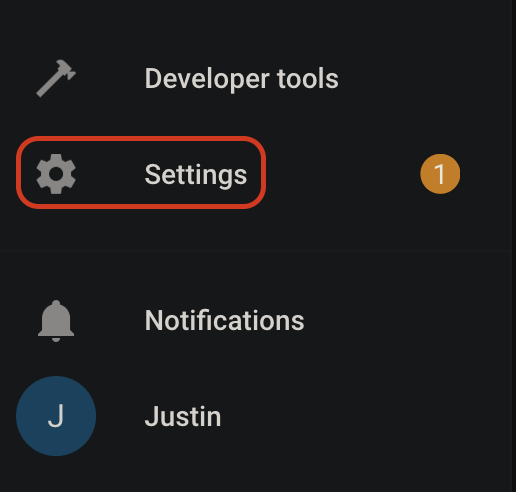
5. Select Devices and services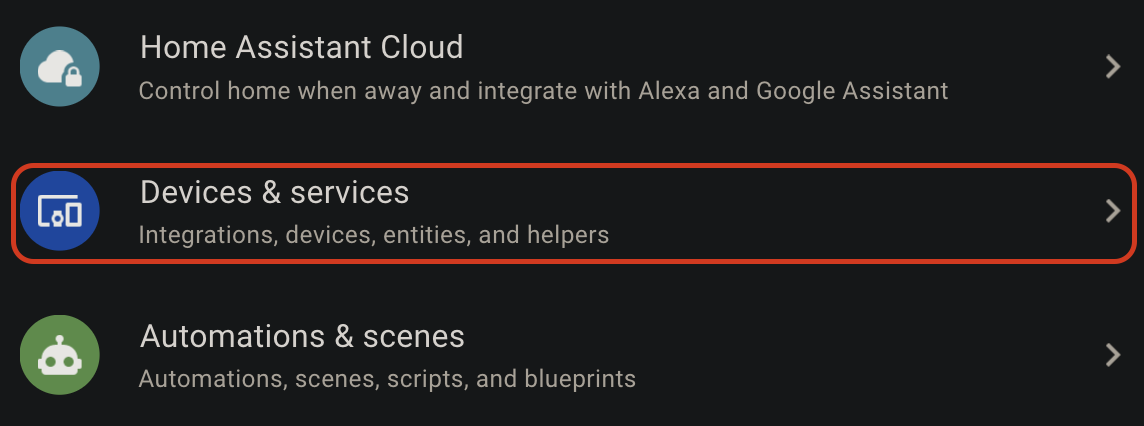
6. Select ESPHome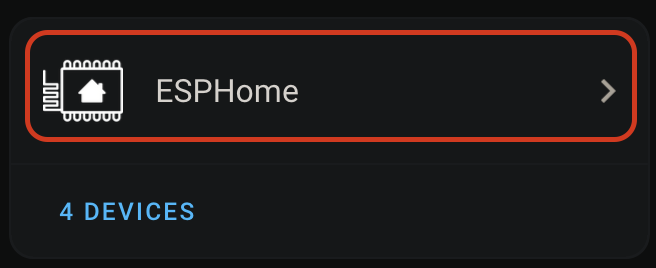
7. Select your MTR-1 device
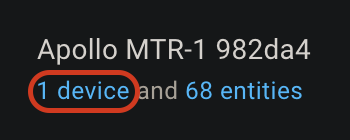
8. Scroll down to the Configuration section and you should see Zone 1-3 X and Y boxes.
- LD2450 Bluetooth can be turned on if you would like to use the HLKRadarTool App to configure the zones.
- Multi Target Tracking toggled on helps it detect up to three targets better (still trying to figure out "how" this works).
- Zone Type allows you to select Disabled, Detection, or Filter.
- Disabled: Disable zone area detection
- Detection: Only detects targets in the specified zone
- Filter: Excludes a zone from detection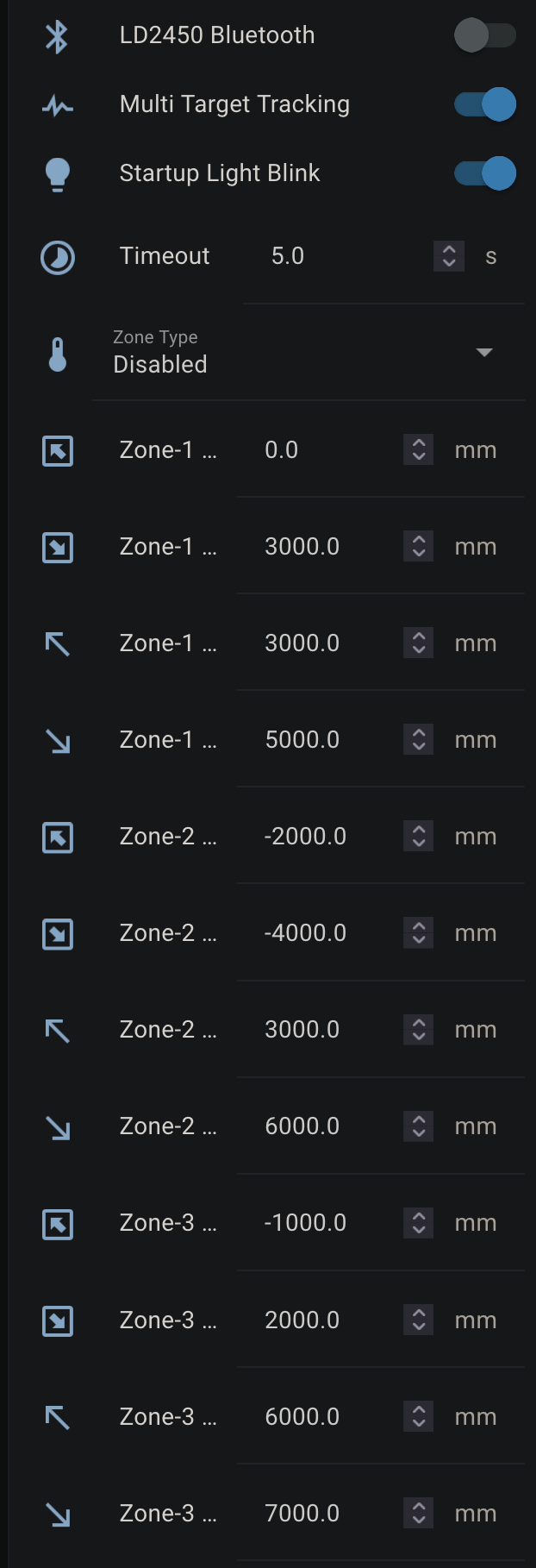
9. Now we can input our Zone 1-3 X and Y values to make our zones. Using the visual card from above, we can walk, sit, or stand in the area where we want to create a detection or non-detection zone. Input values for X are -7000 mm to 7000 mm, and the Y values are 0 mm to 7000 mm.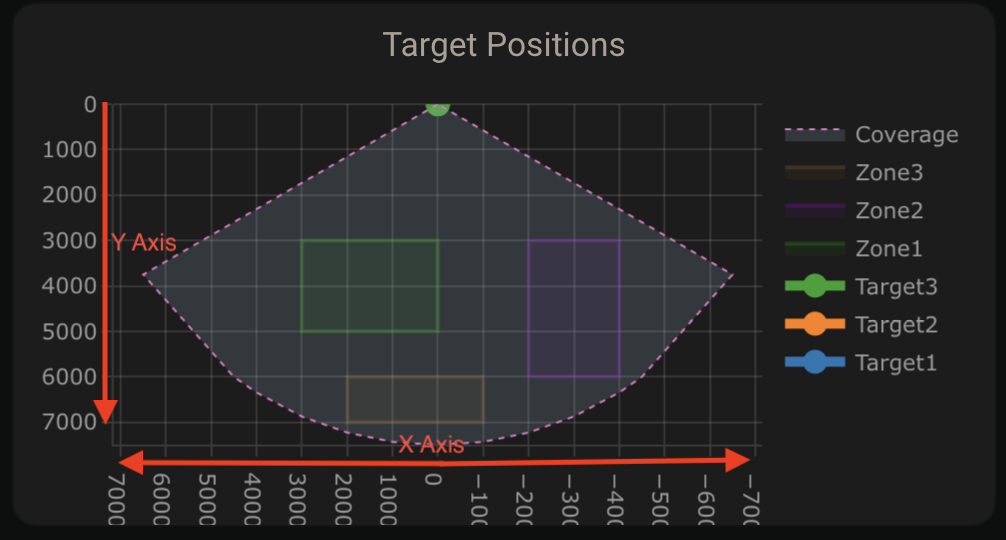
10. For the targets to show up correctly we first need to update the Target 1-3 X and Y measurements from inches (in) to millimeters (mm). Find Target 1-3 X and Y under the Sensors section and select them. You will want to update all 3 targets X and Y values.
11. Select the Settings cog in the top right.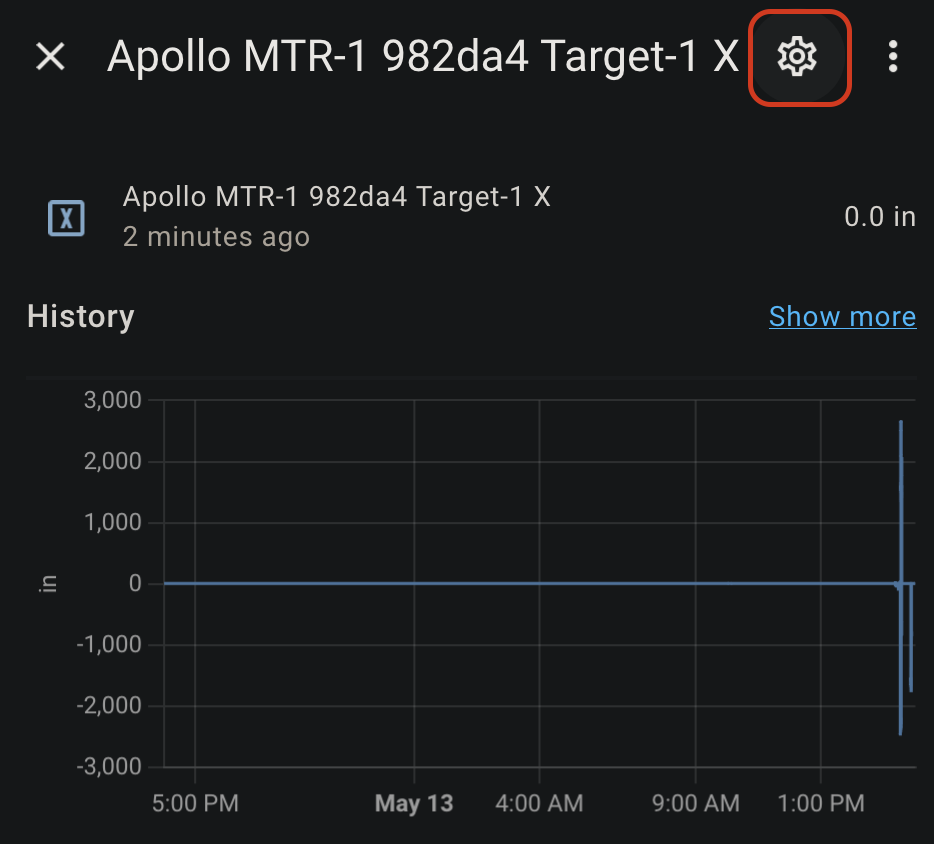
12. Change the unit of measurement to mm and select Update.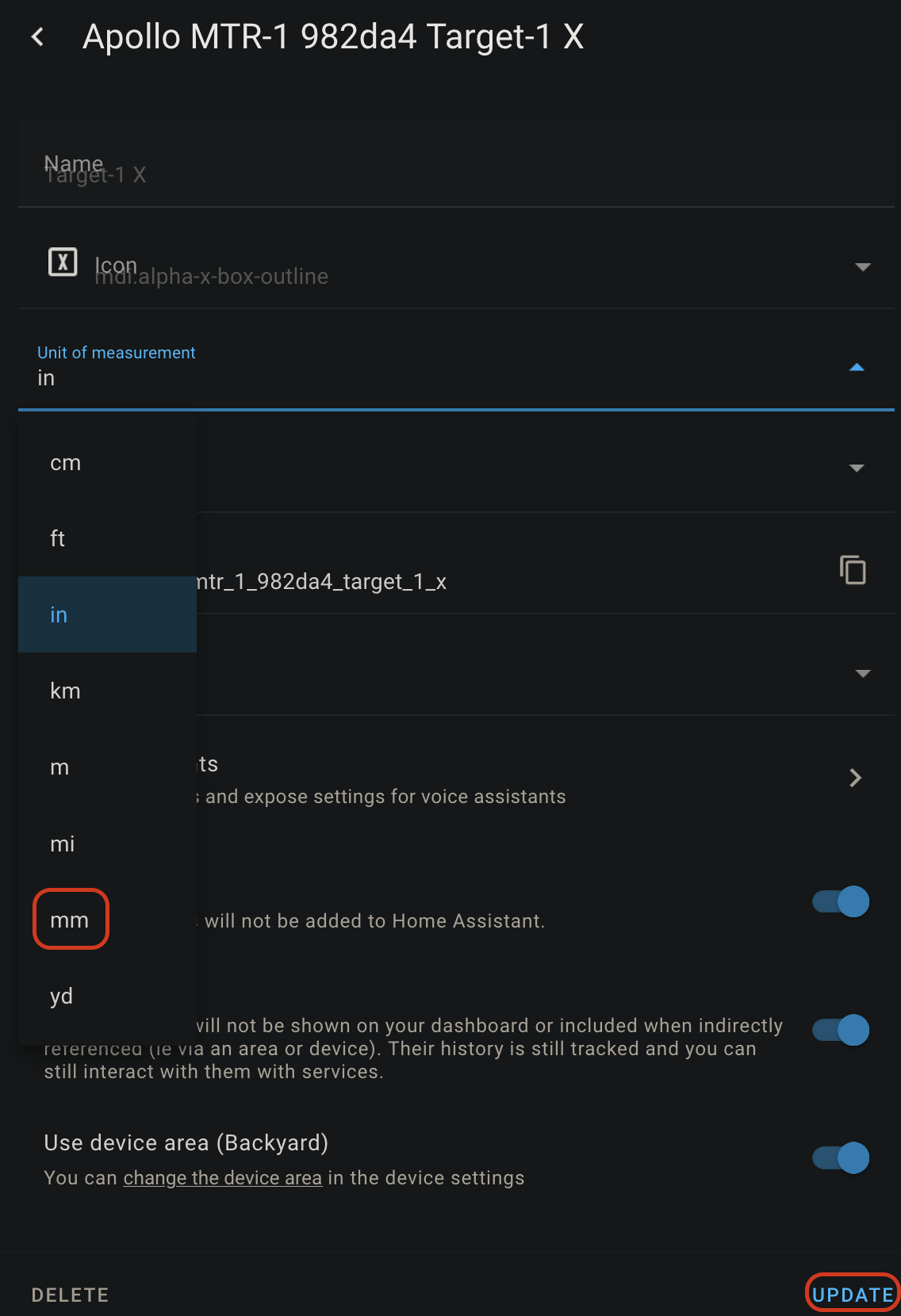
13. Now you should see targets on the card.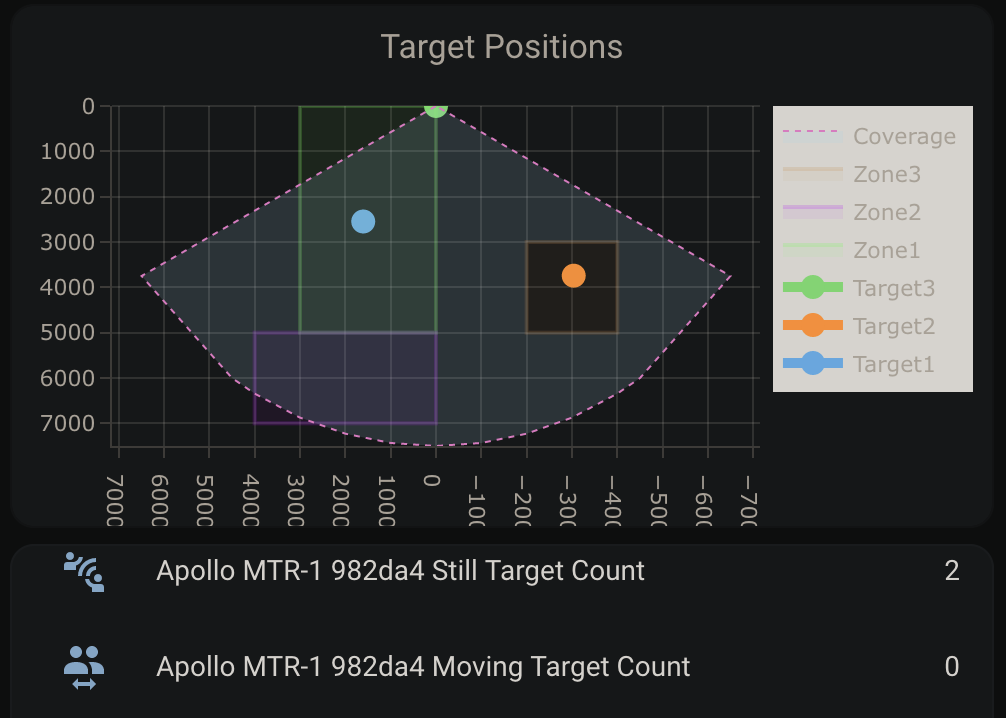
14. Now we can make zones around the targets where you want to Detect presence or filter them out!
15. If your zone configurations are not saved when restarting the device then try turning on the LD2450 Bluetooth for a few seconds and then turning it off again. This should wake up the mmWave module and retrieve your saved zones. (Thanks to our Discord members for helping figure this out)
